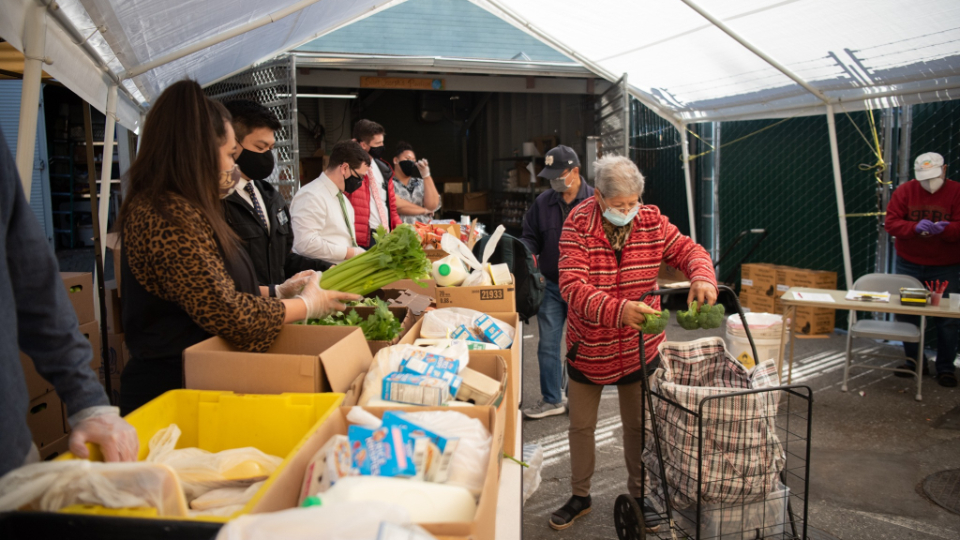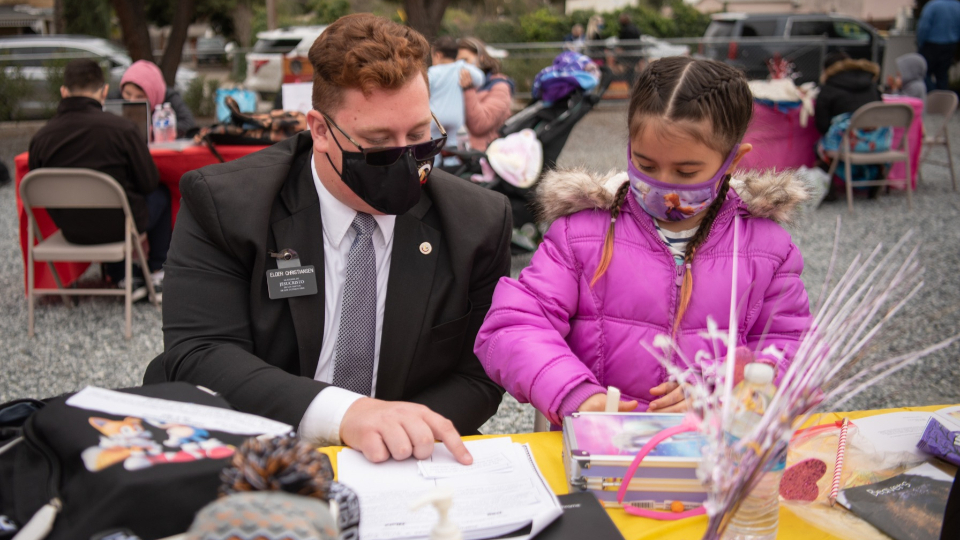It has been said that to transform atomized individuals into a strong society, people must build something together by engaging in projects that promote the common good.
This has been happening for much of the past year in the Bay Area of California. Take, for example, the food bank Second Harvest of Silicon Valley. It has fed some 500,000 hungry Californians every month—double the demand it had prior to the pandemic.
“It is an absolutely Herculean task to serve our community with this high need,” said Cat Cvengros, the food bank’s vice president of development and marketing. “There’s no way we could have doubled our business in that short amount of time had we not had everyone pitch in. Our volunteers make up about 40 percent of our workforce. When shelter-in-place went into effect [in March 2020], we lost that. And we had double the folks that needed us. So how [were] we going to navigate that?”
-
- San-Jose-Community-Service
- San-Jose-Community-Service-
- San-Jose-Community-Service
- San-Jose-Community-Service-
- San-Jose-Community-Service-
- San-Jose-Community-Service-
- San-Jose-Community-Service-
- San-Jose-Community-Service-
- San-Jose-Community-Service-
- San-Jose-Community-Service-
- San-Jose-Community-Service
- San-Jose-Community-Service
- San-Jose-Community-Service-
- San-Jose-Community-Service-
- San-Jose-Community-Service-
- San-Jose-Community-Service-
- San-Jose-Community-Service-
- San-Jose-Community-Service-
- San-Jose-Community-Service-
- San-Jose-Community-Service
- San-Jose-Community-Service-
- San-Jose-Community-Service-
- San-Jose-Community-Service-
- San-Jose-Community-Service-
- San-Jose-Community-Service-
- San-Jose-Community-Service-
| Temple Square is always beautiful in the springtime. Gardeners work to prepare the ground for General Conference. © 2012 Intellectual Reserve, Inc. All rights reserved. | 1 / 2 |
Cvengros said that ability came thanks to consistent support from helpers such as missionaries in the California San Jose Mission of The Church of Jesus Christ of Latter-day Saints. The mission is one of more than 300 partners Second Harvest of Silicon Valley works with to help feed the hungry.
In the past 10 months at Second Harvest, these young ambassadors of the faith have spent more than 13,000 hours boxing and distributing 3.8 million pounds. With other service opportunities in the area added to these numbers, the California San Jose Mission has put in a total of 25,000 hours, or 3,100 working days, of service.
“We love the spirit of the volunteers who have stepped up,” said San Jose Mayor Sam Liccardo. He thanked the mission for its consistent service and ongoing dedication. “That has made all the difference for our community.”
Such volunteerism has helped these missionaries experience the truth of Jesus’s teaching that “whoever loses their life for my sake will find it” (Matthew 10:39, New International Version).
Elder Rumble of New Jersey said the service at Second Harvest was an important outlet during the early days of the pandemic. The opportunity to volunteer allowed him and his missionary colleagues to spend more time outside of their apartments during a difficult lockdown and experience the deep joy of helping those in need.
“It’s really cool because I get to see people telling me, ‘Thank you for doing all this.’ And I’m just like, ‘Yeah, I’m just helping out,’” Elder Rumble said. “And then I go out into the community and I see people with those same boxes. I’m just like, ‘Wow, you know, I probably made that box for that family.’ It really makes you feel good.”
“There’s a lot of sadness and hardship going through the world,” added Elder Van Der Watt of Utah. “And service brings people closer together. It creates a unity … with people, and it helps bring peace and joy into your life because you’re taking time out of your day to serve someone else who may be struggling more than you. And it makes you humbled and grateful for what you have.”
Portuguese Community Center
Missionaries are also helping at the Portuguese Community Center (PCC) in San Jose. This is one of 1,000 locations where food packed at Second Harvest of Silicon Valley is distributed directly to those who need it.

San-Jose-Community-Service-
Volunteers distribute food to those in need at the Portuguese Community Center in San Jose, California, in February 2021.2021 by Intellectual Reserve, Inc. All rights reserved.“[I’m here for] the first time today,” said one recipient in early February. “I [felt] very good when I got the support.”
A woman named Carla said the free food alleviates her worries as a mother. “I have a little son, just 2 years old, and it helps a lot,” she said.
In addition to passing out provisions, these young elders and sisters also share the soul-lifting sustenance of smiles and conversation.
“We’re also just communicating with them, giving them a little conversation here and there, trying to just brighten up their day, spread some positivity when they need it because it’s hard out there,” said Sister Sika of Utah.
Eighty-six-year-old Decio Oliveira, who has volunteered at the PCC for more than a decade, said serving alongside missionaries has lightened and brightened his life. “I love it. I feel younger,” he said. When each missionary leaves (they serve for only 18 to 24 months), life becomes a little dimmer.
“We work here like a family, and it gets to a point that there is a big attachment … among us,” he said in February. “It so happens that last week we lost five — three went to Utah; one went to Boise, Idaho; the other one to Los Angeles. And, let me tell you, we miss them. We really miss them. Fortunately, we have Facebook that we [use] to get in touch.”
Edward ‘Boss’ Prado Foundation
In Morgan Hill, a city 30 miles southeast of San Jose, missionaries have been volunteering for six years with the Edward ‘Boss’ Prado Foundation. This organization was created in 2013 by Gary and Cecelia Ponzini in honor of her son, Edward, who died at age 29.
After the onset of the pandemic, Cecelia started a program called Para Los Niños (For the Children). It offers free internet, computer access and tutoring for children who do not have technology at home and whose parents struggle to help with homework because English is their second language.
The missionaries, who speak Spanish and volunteer in all 15 of the foundation’s programs, are helping children better understand their schoolwork.
“They jumped right in, and they all speak Spanish. That is the beauty of it,” Cecelia said.

San-Jose-Community-Service-
A missionary in the California San Jose Mission helps a girl with her homework in February 2021. Missionaries have been volunteering for six years with the Edward ‘Boss’ Prado Foundation. The foundation runs this program, which offers free internet, computer access and tutoring for children who do not have technology at home and whose parents struggle to help with homework because English is their second language.2021 by Intellectual Reserve, Inc. All rights reserved.“Having the missionaries come here, who speak fluent Spanish — I mean, I’m embarrassed [that] of all the years of Spanish I had in school, all I can say is ‘Where’s the bathroom?’” added Morgan Hill Mayor Rich Constantine with a laugh. “Having them here to be able to facilitate the learning and to speak to Spanish speakers in their own language, fluently, without having to fumble over words is just tremendous.” Because his city is small and its resources few, Mayor Constantine said, “If we didn’t have [Cecelia and the Church helping out], the city would not be thriving the way it is now.”
Sister Ivins of Utah said this tutoring helps ease the load the parents carry.
“It’s definitely taking a burden off their shoulders because the parents have to worry about work and school. And not knowing the language to help their kids was really stressful,” she said. “We were able to just sit at their table and help their kids do their homework so that when they went home, they had a little bit more family time together.”
California San Jose Mission President Gary A. Smith described these pandemic service opportunities as a “saving grace” for the young men and women he oversees.
“Our missionaries were able to step in and fill a need,” said President Smith, a New York native who lived in Arizona prior to joining this mission with his wife, Tera. “And that need was filling boxes and then helping to distribute those boxes. And … at times we were doing some door-to-door deliveries of those food goods to people. And that helped out a lot. And it did a lot of good for the community.”
In addition to helping the city, Sister Smith said, the service has helped the missionaries “get outside themselves” and “engage in something that is meaningful.” “It has helped tremendously for their spirits and their mental health and well-being to be able to get out and serve.” And, as President Smith said, the missionaries are learning “how to mourn with those that mourn and comfort those who stand in need of comfort, and how to really become ministers.”
The service given by the California San Jose Mission in the past 10 months is being duplicated by the Church in communities all over the world. Missionaries are coming together with neighbors to build small but important partnerships that, like yeast, lift the whole loaf of society.
“People are very passionate about bringing the community together to tackle these challenges that we all face and help those who are struggling the most,” San Jose Mayor Liccardo said. “And obviously [The Church of Jesus Christ of Latter-day Saints] has been a leader in really serving with that spirit. It really demonstrates to a very divided country how as a community we can come together. That’s something we critically need right now.”